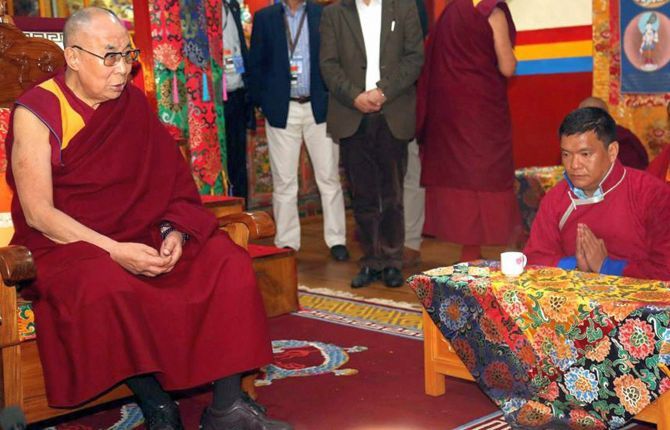Samdong Rimpoche's visit to China materialised against the backdrop of strained India-China relations consequent to the face-off between Indian and Chinese troops at Doklam, says former RA&W officer Jayadeva Ranade.

There have been important developments relating to Tibet since the Chinese Communist Party congress ended in Beijing on October 25, 2017 and the two months thereafter.
All of them have implications for India and some could potentially put India under sustained pressure.
The first was the indication that the Chinese Communist Party's central committee's united front work department, which is responsible for supervising non-Communist parties and ethnic minorities including the Tibet and Xinjiang Autonomous Regions, was preparing to take fresh initiatives.
This was the dramatic 'leak' that Samdong Rimpoche -- a former two-term Kalon Tripa ('prime minister') of the Tibetan administration-in-exile and among the Dalai Lama's most trusted advisers -- had quietly travelled to China in late November 2017.
Samdong Rimpoche, who was nominated a month earlier as the Dalai Lama's envoy for talks with the Chinese authorities, would certainly have met senior Communist party leaders during his four-day stay in Kunming, capital of China's Yunnan province.
There is speculation that Rimpoche could have met You Quan, a former party secretary of Fujian province whom Chinese President Xi Jinping appointed director of the united front work department in November or Zhang Yijiong, executive vice minister of the UFWD.
If Rimpoche met Chinese leaders, this would be the first acknowledged contact between an envoy of the Dalai Lama and Chinese Communist officials since negotiations between the two sides were suspended in 2010.
China's official media has, however, not yet mentioned a visit by a senior leader to Kunming during this period.
Dr Lobsang Sangay, the Sikyong (head) of the Central Tibetan Administration, obliquely confirmed that Professor Rimpoche had visited China. He was replying to a question posed by former foreign secretary Kanwal Sibal on the sidelines of the M L Sondhi memorial lecture in New Delhi on December 14, when he cautioned 'Don't read too much into it. At most it's a private visit and it's too early to say anything.'
It is pertinent that Lobsang Sangay -- who is the other envoy nominated by the Dalai Lama for talks with the Chinese -- did not accompany Samdong Rimpoche probably because China continues to adhere to its policy of not recognising the Central Tibetan Administration in Dharamsala. No relaxation has been noticed in China's policies towards Tibetans or Tibet so far.
Samdong Rimpoche's visit also materialised against the backdrop of strained India-China relations consequent to the face-off between Indian and Chinese troops at Doklam and threats made at the time by China through its official media.
It comes too in the wake of an international conference convened by the Tibetan administration-in-exile in October 2017 to finalise a long-term action plan, including revival of Tibetan Buddhism in the Indo-Himalayan border belt.
At the same time a securitisation of Tibet is taking place. Following up on Xi Jinping's work report to the party congress -- which for the first time devoted an entire section to poverty alleviation -- the Tibet Autonomous Region has launched a campaign to tackle poverty and simultaneously enhance security.
It has decided to build 'well-off border villages' along Tibet's 'borders with India, Nepal, Bhutan and other neighbouring countries to ensure the security of the borders and maintain stability' in the region.
The State-owned Global Times newspaper on December 25, 2017 asserted that 'confronting separatism remains a challenge for the region. Raising living standards for local residents is a fundamental way to guard against activity sabotaging China's sovereignty and territorial integrity'.
'Tibet's rural poverty alleviation,' the newspaper added, will help maintain stability in the border areas'.
Tibetan Buddhist monks and nuns in the TAR are being co-opted to sensitise people and ensure that Buddhism serves socialism.
Additionally, the decision to bring the people's armed police force (PAPF) directly under the central military commission with effect from January 1, 2018 puts Tibet under the direct control of the people's liberation army (PLA).
Xi Jinping had earlier appointed PLA officers loyal to him as the commander and political commissar of the PAPF.
Since the PAPF is deployed in strength in Tibet's main towns, rural countryside and border areas, the PLA officers -- who are now being re-inducted into the party standing committees at the provincial and county levels -- will have an enhanced role.
In addition to deploying PAPF troops when civilian authorities request assistance, the PLA officers will have a greater role in military-civil coordination and be directly involved in building the 'well-off border villages'.
Each of these villages is to be connected by road, thereby facilitating military movement along the border with India.
Finally, the TAR leadership is being encouraged to push the Belt and Road Initiative and Bangladesh China India Myanmar Corridor with Tibet's neighbours.
To promote the BRI and BCIM, China has announced it will expand TAR's road network from 82,000 kms to 89,000 kms by 2020.
Chinese officials have earlier pointed out that there are 70 road links between China and Nepal and there have been suggestions of a new China-Nepal-India Corridor.
The aim will be to build pressure on India by creating public opinion, including by co-opting Tibetans, to endorse the BRI and China's plans of connectivity.
Jayadeva Ranade, a former Additional Secretary, Cabinet Secretariat, Government of India, is presently President, Centre for China Analysis and Strategy.











 © 2025
© 2025